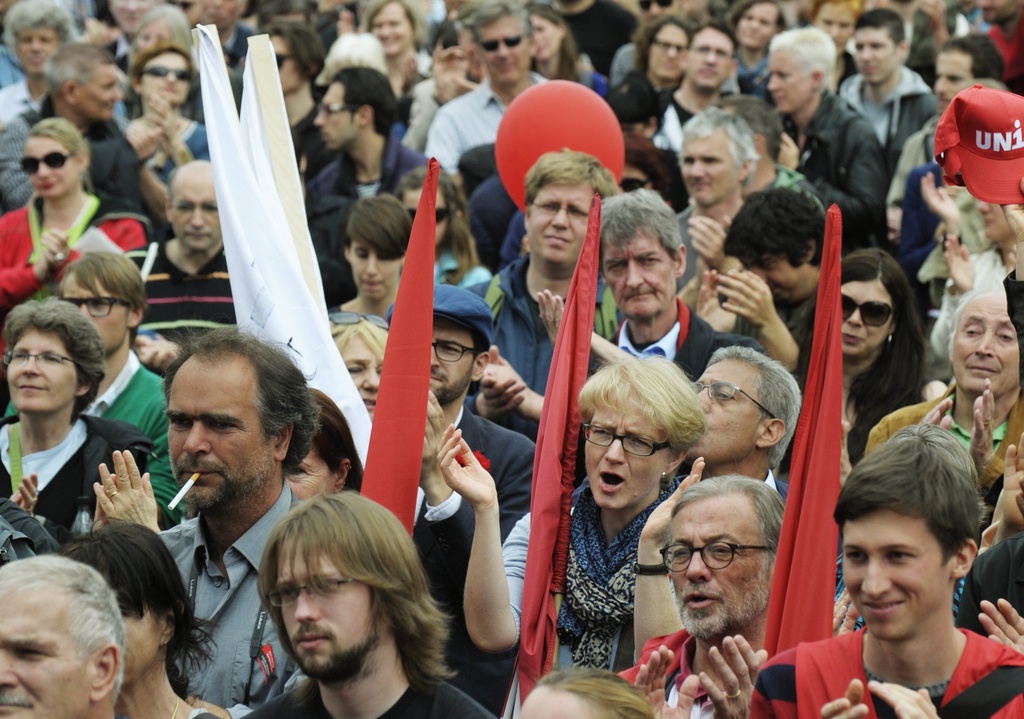Executive pay plunges for banks, not for others

Salaries for top managers at the largest Swiss banks declined by 23 per cent in 2011 while senior staff in other business sectors earned five per cent more, according to latest data from the Swiss Foundation for Sustainable Development, Ethos.
Forty-nine of the 100 biggest Swiss companies also put their managers’ salaries to a shareholder vote, four more than did so in 2010.
The annual report from the Geneva-based foundation says more self-regulation is still needed, despite the “positive impact of these votes on the transparency and structure of board and executive remuneration.”
The management team at pharmaceutical giant Novartis pulled in the highest salaries in 2011, with CEO Joe Jimenez earning SFr15.7 million ($16.4 million) and chairman of the board Daniel Vasella bringing home SFr13.5 million.
Chief executive Severin Schwan of the pharmaceutial company Roche came third.
Credit Suisse CEO Brady Dougan saw his salary decline the furthest since the previous year, by more than half to SFr5.8 million.
The top 20 highest paid chairmen received more than SFr1 million each according to the survey, which was published on Friday.
Hot topic
The issue of executive pay has been a hot topic in Switzerland since the global financial crisis in 2008, in the aftermath of which Swiss businessman-turned-politician Thomas Minder launched an initiative to curb executive pay.
His proposal was followed by years of back-and-forth counter-proposals from parliament.
In June, parliament submitted its final take on the proposal to go to a nationwide vote by March next year. It is a multi-pronged plan that would let voters choose among three options.
The public could vote to give shareholders the binding right to reject company remuneration plans.
Or, it could opt for a counterproposal to impose a new tax on the biggest executive pay-outs. A third option would be to reject both of these ideas and trust politicians to enact an indirect counterproposal – essentially a watered-down version of Minder’s original proposal.
Ethos director Dominique Biedermann described the initiative as a step in the right direction. However, the foundation prefers a legal amendment forcing company boards to publish remuneration plans to be approved by shareholders.
The youth wing of the Social Democratic Party has collected enough signagures for its initiative to cap manager salaries at a maximum 12 to one ratio against the lowest-paid employees in a company.
The initiative to put an end to excessive executive pay and boost shareholder rights was handed in with more than 118,000 signatures in 2008.
Unions regularly complain that the gap between the pay of top managers and shop floor workers has been steadily increasing in recent years in Switzerland.
Minder’s initiative plans to allow shareholders to veto listed company pay plans, force pension funds to vote every year and reveal their voting patterns and to outlaw golden hellos and parachutes.
In 2010, Minder struck a deal with the strongman of the rightwing Swiss People’s Party Christoph Blocher and agreed to withdraw his initiative if parliament approved a reform of the shareholder law.
This plan was botched by the other main parties, which accused Blocher, a multi-billionaire businessman and former justice minister, of misleading voters.

In compliance with the JTI standards
More: SWI swissinfo.ch certified by the Journalism Trust Initiative





You can find an overview of ongoing debates with our journalists here. Please join us!
If you want to start a conversation about a topic raised in this article or want to report factual errors, email us at english@swissinfo.ch.